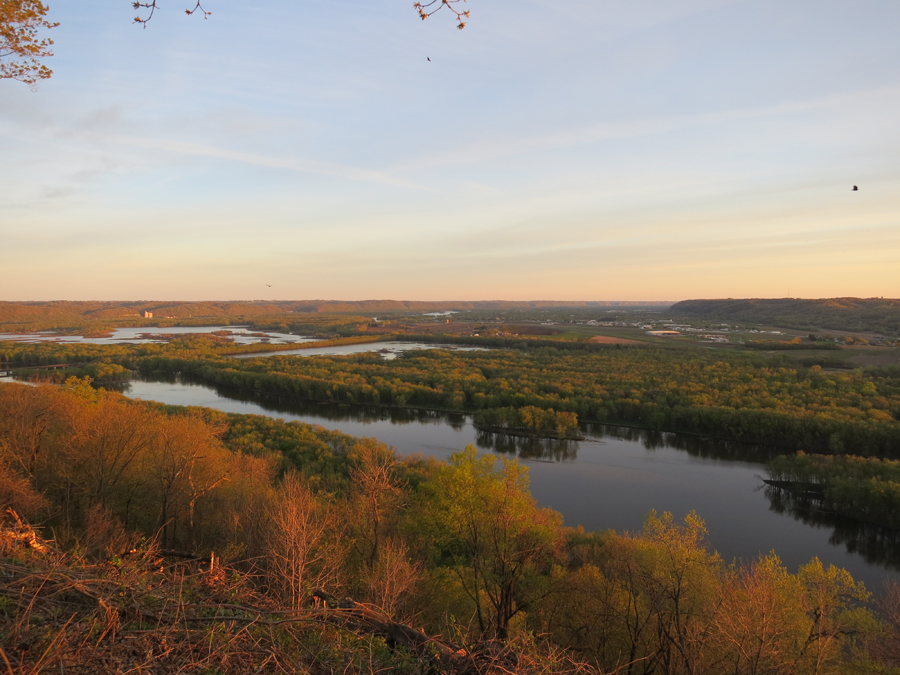You have /5 articles left.
Sign up for a free account or log in.
 Spring Recess as it is called here is coming to a close, alas. My highlight was camping for three days on a bluff overlooking the confluence of the Wisconsin & Mississippi rivers -- the scenery was spectacular, the company wonderful, and it was a true pleasure to be disconnected from ‘the grid’ for a while.
Spring Recess as it is called here is coming to a close, alas. My highlight was camping for three days on a bluff overlooking the confluence of the Wisconsin & Mississippi rivers -- the scenery was spectacular, the company wonderful, and it was a true pleasure to be disconnected from ‘the grid’ for a while.
Since coming back to Madison I discovered that Yale faculty passed a rather bizarre, in my view, resolution about politics in Singapore. Really, come on folks, if your core concern is with how Yale governs the implementation of its internationalization strategy, how Yale is led, and the nature of Yale’s overseas engagements, then surely it makes more sense to focus the resolution on Yale (your university) vs the country of Singapore!
While I was away I also learned, via the various mechanisms I use to track links, RTs (via Twitter), and repostings, that Dr. Michael Montesana’s recent entry (‘Is Yale a Reliable Partner for the National University of Singapore?’) generated a large volume of traffic on both the WordPress.com and Inside Higher Ed sites that GlobalHigherEd is hosted on. A variety of people from around the world also emailed me about it.
A noteworthy aspect of the feedback I received was that readers (including many Singaporeans) were appreciative of Dr. Montesano’s concentrated focus on Yale versus Singapore, and the broader histories and networks that intersect with the Yale-NUS College formation process. Regardless of whether you agree or disagree with his style of argumentation, and final recommendations, Montesano’s entry was flagged as providing a relatively novel and wide window (not the window, of course) on the Yale side of the development process, especially by someone who knows and cares about both Yale and Singapore.
Now, let’s stand back and reflect on this situation.
First, there is an abundance of advocacy-oriented representations that are required to legitimize such global higher ed ventures, but there is remarkably little concurrent (and autonomous) analysis of the key related issues. And while Montesano’s entry is an opinion piece, it is framed in an analytical way, seeking to identify the complicated forces, contradictions, currents of thought, and networks, that led Yale’s leaders to seek a link (via Yale-NUS College) to this unique Southeast Asian city-state.
Second, let’s think about audience. Montesano’s entry is about a higher education phenomenon, and people associated with universities have a thirst for knowledge about what is really going on regarding the plethora of objectives, the complicated politics, and the ever evolving constellation of social relations, that bring an endeavor like Yale-NUS College to life. This thirst for more nuanced and lengthy forms of argumentation drew people to his entry for he is making a sustained argument that is designed to be engaged with, debated about, agreed or disagreed with.
The case for learning while doing
One of the lessons I am starting to take away about debates about Yale-NUS, as well as other forms of higher education experiments (e.g., the European Higher Education Area), is that it is not enough for the key stakeholders to advocate while only providing basic background information. Why is this so? Well, the stakes in these ventures are too high, there is a thirst for knowledge about the emerging, and most people associated with higher education have a critical-analytical instinct guiding their thinking (as must be the case).
Given the above, I would argue that much more needs to be done to engender concurrent research and deliberative fora about the transformative initiatives universities are considering, being drawn into, and are developing (often with foreign partners). This is a point my Europe-based colleagues (esp., Anne Corbett, Roger Dale, and Susan Robertson) have been making for some time about the Bologna Process, where there is an abundance of advocacy, and contract-derived research, but a paucity of 'intellectually autonomous' analysis about the deeper meanings, histories, and implications of the Bologna Process. See, for example, 'From where I sit - We're scholars, not politicians' (Times Higher Education, 3 November 2011), as well as 'Time for blue skies thinking about the future of higher education in Europe,' University World News, 8 April 2012).
What to do about the paucity of research and analysis about emerging experiments in globalizing higher ed? Well, remember that we (the experimenting universities) are higher education institutions with significant in-house research capabilities! Using our own resources, and our connections to relevant funding councils, we could easily do some or all of the following:
- Upper level undergraduates, and graduate students, could be funded to assist in the development process, effectively ensuring that they engage in intensive forms of participant observation. Their experiences could generate the data for honor’s theses, MA and PhD projects, and/or research-based publications and related websites. Collaboration between students in partner universities would likely build bridges, and generate enhanced understandings of the development process.
- Active universities, perhaps working in conjunction with key funding councils and foundations, could fund basic (blue skies) research about a wide array of relevant issues, debates, and phenomenon. This would likely have to take a ‘special initiatives’ format given that this kind of phenomenon has a unique life-cycle, at least with respect to the development process.
- Relevant business and law schools, as well as science and technology studies programs, could develop detailed case studies stretching from the formative phases of negotiations through all stages of the implementation process, the launch of a new venture, and the first few years of its existence.
- Archives of all key correspondence, minutes of meetings, curricula in various stages of development, contracts and agreements, etc., could be systematically preserved for internal and external researchers, current and future. Open access sites of documentation could be easily established and incrementally added to while simultaneously moving through all stages of the implementation process. This type of information could also be drawn upon by the higher education media, with one obvious benefit being less risk of error of interpretation.
There are likely many other ideas along these lines, though as Anne Corbett implies, they would have to be organized in a manner that respects "academic values and intellectual autonomy."
In closing, there is strong desire for more information, transparency, and especially nuanced analysis about the emerging landscape of global higher education and research. If we just ‘do’ then we miss opportunities to learn along the way, and help educated ourselves and interested others. And apart from learning, even critical ‘blue skies’ research can feed back into the development process and engender more informed and nuanced debate on the complex realities of such endeavors.
Sounds like a win-win proposition to me.

